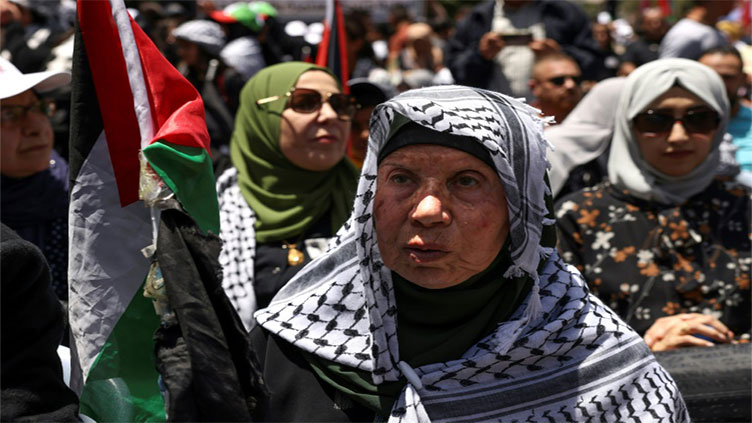Demonstrations in the occupied West Bank to mark 75 years since 'Catastrophe'

World
According to the UN, more than 760,000 Palestinians fled or were expelled from their homes in 1948.
WEST BANK (AFP) - Thousands from across the occupied West Bank demonstrated Monday, waving Palestinian flags to mark the 75th anniversary of the "Nakba" or "catastrophe" which they associate with Israel's creation.
According to the UN, more than 760,000 Palestinians fled or were expelled from their homes in 1948.
In Ramallah, the seat of the Palestinian Authority, protesters carried black banners that read "Return" and also raised images of old keys, a symbol of the Palestinians' plight and demand for recognition of their right to return.
Commemoration of the Nakba this year comes during heightened tensions in the Israeli-Palestinian conflict, which has claimed more than 170 lives on both sides since the start of the year.
Thirty-five people, almost all of them Palestinian, were killed during five days of fighting between Israel and armed groups in the blockaded Gaza Strip last week.
Israel was established on May 14, 1948 following a United Nations vote in November 1947 that divided the British Mandate for Palestine into a Jewish and an Arab state.
A day after Israel declared statehood, five Arab armies attacked the young nation. In the war that ensued, Israel defeated the Arab forces.
During the conflict, more than 600 communities were destroyed or depopulated by Jewish forces, according to the Israeli organisation Zochrot.
Palestinians have since demanded a right to return, which Israel has steadfastly denied, claiming it would be tantamount to a demographic surrender of the state's Jewish nature.
According to the United Nations, there are now 5.9 million Palestinian refugees living in the West Bank, the Gaza Strip, Jordan, Lebanon and Syria.
Israel celebrated its 75th Independence Day on April 26, according to the Jewish calendar.
'RESPECT INTERNATIONAL RESOLUTIONS'
For the first time, the United Nations commemorated Nakba at its headquarters in New York on Monday, after a resolution was passed in November.
Palestinian Authority president Mahmud Abbas, whose "State of Palestine" has UN observer status, spoke in Arabic at a special session of the Committee on the Exercise of the Inalienable Rights of the Palestinian People.
"We demand today officially, in accordance with international law and international resolutions, to make sure that Israel respects these resolutions or suspend Israel's membership of the UN," Abbas said, referring to hundreds of UN resolutions over the years that Palestinians view as guaranteeing their rights.
During the hour-long speech he said that Nakba "did not start in 1948 and it did not stop after that date."
"Israel the occupying power continues its occupation and its aggression against the Palestinian people and continues to deny this Nakba and rejects international resolutions regarding the return of Palestinian refugees to their homeland."
'NOT A NUMBER'
Back in Ramallah, 64-year-old Khairy Hanun, dressed in a traditional Palestinian costume, was carrying an old suitcase and an old key, symbolising the displacement of 1948.
"We are here to tell the occupation (Israel) that it was like this that they have chased away our parents and grandparents, only with the clothes on their backs", said Hanun, resident of Tulkarm in the northern West Bank.
Within Israel, about two million people -- more than 20 percent of the population -- are Palestinians and their descendants who remained there after the state was founded.
The community of Arab-Israelis, as Israel calls them, was also represented at the gathering in Ramallah.
"One of the greatest mistakes committed by the Zionist movement was that between 150,000 and 160,000 Palestinians remained (in Israel) after the Nakba", said Mohammed Baraka.
"Today, we are almost two million, and we are not a number, but a testament to the national identity Israel had tried to erase," Baraka said.
Nohad Wahdane, whose family lived through the Nakba, said that "these commemorations are organised every year, so that young people can learn their history and not forget it".

